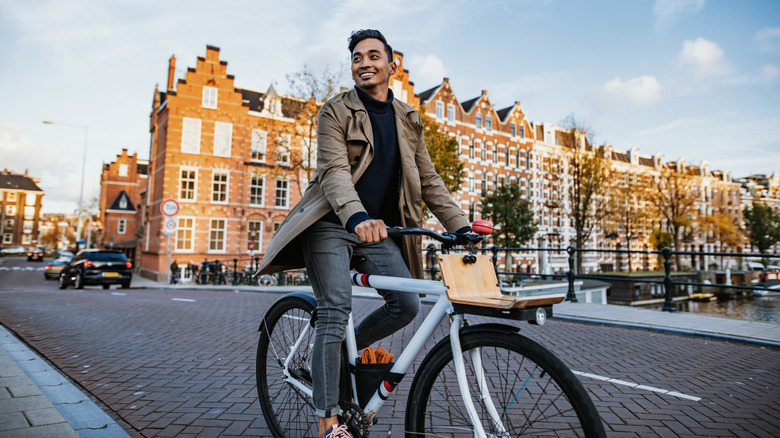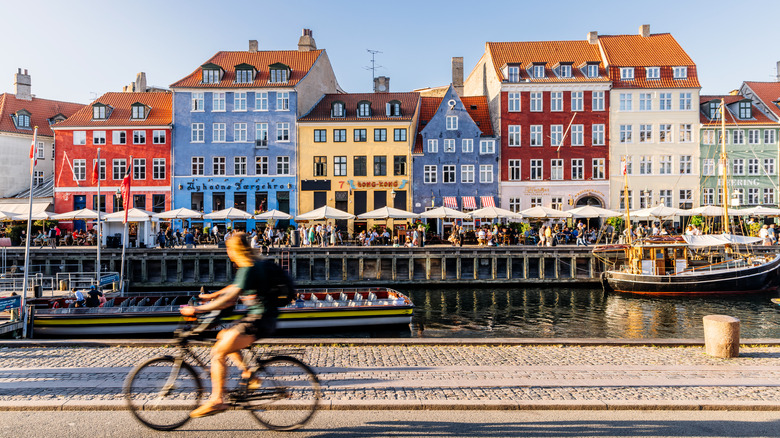One Of Europe's Most Popular Cities Is Generously Rewarding Eco-Friendly Tourists
Europe is having a reaction to mass tourism, and it's not a good one. With anti-tourism sentiment sweeping across countries like the Netherlands, Greece, and Spain, part of the call seems to be for better-behaved visitors — those who show respect for the land they're chosen to travel to. Amidst such a climate, the Danish capital Copenhagen is doing something radically different. It is rewarding tourists who practice eco-friendly behavior with treats such as a free lunch, a glass of wine, a cup of coffee, a kayak rental, and free access to certain cultural experiences.
The initiative is called CopenPay. It's a pilot project by Copenhagen's official tourism authority Visit Copenhagen that's set to run from July 15 to August 11, with hopes of extending it for the rest of the year. The campaign is not driven by a desire to increase tourism. According to CEO of Wonderful Copenhagen, Mikkel Aarø Hansen (via Visit Copenhagen), CopenPay is meant to empower "people to experience more of what Copenhagen offers while placing less burden on our planet. It's about creating meaningful and memorable experiences that are enjoyable and environmentally responsible."
Denmark's capital often ranks favorably in sustainability indexes, coming in at number three, after Gothenburg (Sweden) and Oslo (Norway) in a 2023 list of sustainability leaders (via Global Destination Sustainability Movement). Copenhagen prides itself on thoughtfully crafted architecture, while its artificial ski facility, CopenHill, is built on a waste plant that is turning waste into energy. Biking to and from places is also very popular there.
What is CopenPay, and how can it promote sustainable tourism?
Despite being a green leader, Copenhagen still pushes to improve its environmental standing. GreenKayak allows people to ride their kayaks for free if they help collect trash in the canals. Founder of the NGO, Tobias Weber-Andersen shared (via DW Documentary), "More than 60,000 people have collected more than 94 metric tons of waste with our kayaks."
With CopenPay, the desire is to create a "greener mindset" tourists can take back with them as a "souvenir," per the tourist board's communications chief, Rikke Holm Petersen (via BBC). This European city's initiative has the participation of 24 attractions, all of which offer something free to tourists who want to do their part in keeping the city sustainable and clean. You can opt to pick up trash from the streets, travel by public transport or bike to your destination, volunteer in an urban garden, and more. While some of the establishments involved in the project may require tourists to show proof of their green deed, the initiative is largely rolled out on the basis of trust.
Sustainable travel and eco-forward resorts are not novel concepts. With tourism responsible for 8% of the world's carbon emissions (per Sustainable Travel), it's no wonder that some environmentally-conscious travelers seek out islands that value ecotourism. While you've got to commend Copenhagen for thinking of something so unique, some experts feel that the real environmental problem lies in air travel itself. Cruise ships and airplanes are a fast-growing source of greenhouse gas emissions.
How to be an eco-friendly tourist in Copenhagen
The CopenPay initiative isn't the only option you have to be an eco-friendly tourist in the city. The European city is known for its organic food, bike-friendly landscape, and sustainable shopping all year-round. Even the Copenhagen Fashion Week which happens in August, is considered a leader in sustainability.
With 339 miles of bike paths, you can opt to see the city by hopping on two wheels instead of driving, while the public transport system uses the same ticket for the Metro, s-trains, and buses (including waterbuses). Apart from eco-certified hotels and sustainable shopping centers, you can be mindful of refilling your water bottles at the taps or public drinking fountains, not littering the waters while taking a dip in them, and eating locally to support restaurants on a mission to minimize their carbon footprint. In 2022, Denmark had the highest share in the world of organic food sales as a percentage of its total food market (per FiBL). Apparently, three out of four Danes purchase organic food every week (per Organic Denmark).
The CopenBay initiative is a laudable one, yet it has drawn mixed reviews. While there has been enthusiastic participation from some tourists doing their part to keep Copenhagen green, others have said it's unlikely they'd participate in the reward system, especially if their visit is short. Perhaps you could visit Denmark's capital to try it out! While you're at it, did you know there's another city in Denmark that's a mini Copenhagen without the crowds? Might be worth checking out.

